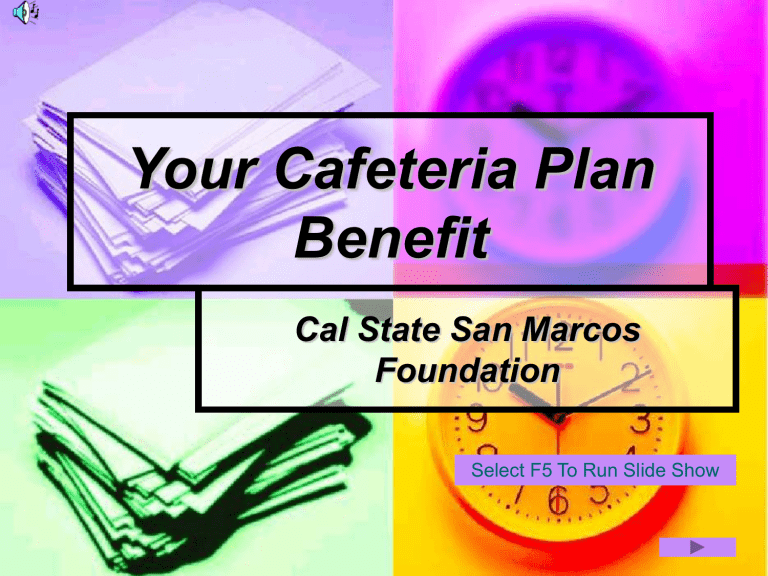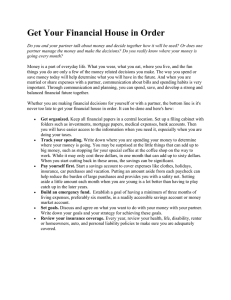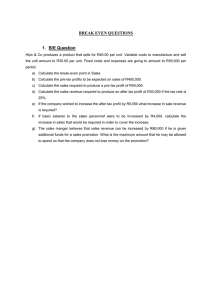Cafeteria Plan Benefits: Cal State San Marcos Foundation

Your Cafeteria Plan
Benefit
Cal State San Marcos
Foundation
Select F5 To Run Slide Show
What is a Cafeteria Plan?
Cafeteria Plans allow employees to pay for company health insurance premiums, health care costs and dependent care costs with pre-tax dollars
Without a Cafeteria Plan, you receive your paycheck first, then after Federal, State and FICA taxes are deducted, you pay for those expenses
How do I benefit?
Using a Cafeteria Plan, you are issued a paycheck from which your insurance premiums, health care costs and dependent care costs are deducted before Federal, State and
FICA taxes
This results in a lower gross amount of your income subject to taxes
Advantages?
Under the Plan, you may elect to receive benefits on a tax free basis.
The amount you pay, or spend for group insurance premiums, “out of pocket” medical expenses, as well as child or dependent care expenses, is deducted from your pay prior to the calculation of payroll taxes (Federal, State & FICA)
This will in turn increase your net spendable income
What does the Foundation’s
Cafeteria plan offer?
Premium Only Plan (POP)
Allows you to elect to have your insurance premiums deducted pre-tax
Reimbursement Accounts
Allows you to set aside pre-tax dollars each pay period to pay for Health and
Dependent Care expenses
Consists of two accounts:
1.
2.
Health Care Flexible Spending Account
(HFSA)
Dependent Care Flexible Spending
Account (DFSA)
Premium Only Plan
If you pay a portion of the monthly premiums for your medical insurance, a cafeteria plan allows you to pay for those premiums with pre-tax dollars
Must elect this option on an annual basis
If you pay no premiums monthly, no need to elect this plan option
Complete a Salary Reduction
Agreement
Flexible Spending Accounts
Health Care Flexible Spending
Account
Normal plan year is January 1st to
December 31st each year
Complete the Flexible Spending
Account Enrollment Form
Annual Maximum: $2,500
Monthly Minimum: $25
Health Care Flexible Spending
Account
Amounts you spend for “out of pocket” health care costs fall into this plan
Costs not covered by your other employee benefits (examples include medical, dental, vision insurances, and prescriptions)
Expenses must be incurred during the plan year or by the end of the “grace period”
(i.e., by March 15 th of the following year)
“Use it or lose it” program applies
For specifics, consult a tax specialist, a
CPA, or refer to IRS Publication 502
What types of Health Care
Expenses can I pay for?
Co-pays
Insurance
Premiums
Deductibles
Dental Care
Vision Care
Orthodontia
Immunizations
Chiropractor
Ambulance
Contact Lenses
Pediatrician
Psychiatrist
Prescriptions
Lab Work
Many, Many
More…
Flexible Spending Accounts
Dependent Care Flexible
Spending Account
Normal plan year is January 1st to
December 31st each year
Complete the Flexible Spending
Account Enrollment Form
Annual Maximum: $5,000
Monthly Minimum: $25
How does the Dependent
Care Account Work?
You may pay for dependent care expenses for qualifying children and/or dependents incapable of self care. Expenses must be incurred to allow you and your spouse, if married, to work or attend school
Child care expenses are allowable for children under the age of 13. Costs for preschool are generally allowable
The care can be provided within or outside your home, but, services may not be provided by one of your dependents
Services provided by a licensed day care provider must follow requirements for the State in which the provider is located
Expenses must be incurred during the plan year or by the end of the “grace period” (i.e., by March 15 th of the following year)
“Use it or lose it” program applies
Dependent Care Continued
Allowed pre-tax up to $5,000 per calendar year if married filing joint return or single filing single return
Pre-taxing the expenses precludes you from taking the credit when filing your taxes
What is my potential savings?
The tax savings will depend on the employee deferral directed to the
Cafeteria Plan and the employee’s tax rate.
Gross Monthly Compensation
Less Pre-Tax Expenses
Group Medical Insurance Premiums
Medical Costs
Dependent Care Costs
Compensation Subject to Taxes
Without
Cafeteria Plan
$3,000.00
With
Cafeteria Plan
$3,000.00
$0.00
$0.00
$0.00
$3,000.00
$75.00
$25.00
$225.00
$2,675.00
Less Taxes and After Tax Expenses
Federal Income Tax (15%)
State Income Tax (4%)
Social Security Tax (7.65%)
Net Pay
Insurance Premiums/Medical/Day Care
Increase in Income Per Month
Increase in Income Per Year
$450.00
$120.00
$229.50
$325.00
$1,875.50
$0.00
$401.25
$107.00
$204.64
$0.00
$1,962.11
$86.61
$1,040
Bottom Line!
You can either continue to pay for your expenses with earnings after Uncle Sam has taken his chunk…or you can pay those same expenses with a portion of your pay before taxes are withheld! It is up to you to decide!
Frequently Asked
Questions???
This sounds too good to be true…is it?
Even though the benefits may seem too good to be true, Federal legislation passed in 1984 formally recognized and adopted Cafeteria
Plans, which are regulated under various sections of the Internal
Revenue Code
See the IRS website at www.irs.gov
for further information on Cafeteria Plans
Are reimbursements taxable?
Reimbursements for qualified expenses are not taxable.
Under Code Section 125, these pre-tax expenses are not declared or reported for income tax purposes, which means they are not taxable now or when filing your taxes!
Will this affect my other benefits?
Participation in the Plan will not affect any other benefits you may receive, or your ability to participate in qualified plans (i.e. retirement plans, etc…)
What does the phrase “use it or lose it” mean?
The plan is a “use it or lose it” benefit, so a conservative approach when estimating your pre-tax expenses should be used. You will have 30 days after the “grace period”
(i.e., 30 days after March 15 th = until
April 14 th ) to claim any reimbursements for the previous plan year. Any expenses not claimed will be forfeited. In other words, “use it or lose it!”
What happens if I change employers?
The plan provides an extended period of time for you to submit claims for reimbursement to the administrator
Do I have to pay for expenses before I am reimbursed?
No. Expenses are reimbursed as they are incurred. It is not necessary that they be paid first
(Incurred means the date the service was provided/received at the doctors, dentist – not the date billed or paid)
What name is on the reimbursement check?
It is payable to you! The check reimburses you/your family for expenses you’ve incurred
How do I know what my balance is?
If you do not claim reimbursements you will receive your account statement at the end of the third quarter of each plan year, otherwise you will receive statement information with each reimbursement check
Can I change my pre-tax amounts?
The plan allows for increases/decreases in election amounts in the event of a qualified job or family status change. A qualified change may include: marriage, divorce, adoption, birth of a family member, or a significant change in employment status of spouse
May I claim expenses for my family?
Yes! The plan allows you to receive reimbursement for expenses incurred on you, your spouse, and all eligible dependents
What if I have other questions?
Call Flex Pensions at (562) 308-
2494
Or call Foundation Human
Resources at: (760) 750-4700
How do I sign up for the plan?
See the following documents:
Instructions for Flexible Spending
Accounts
Complete the Salary Reduction and Enrollment Form
Plan for your future…
During the benefit open enrollment periods you have options and decisions to make.
Take the time to review all the available options you have. Use your tax advantages wisely and choose the best alternatives for you and your family…
The End


